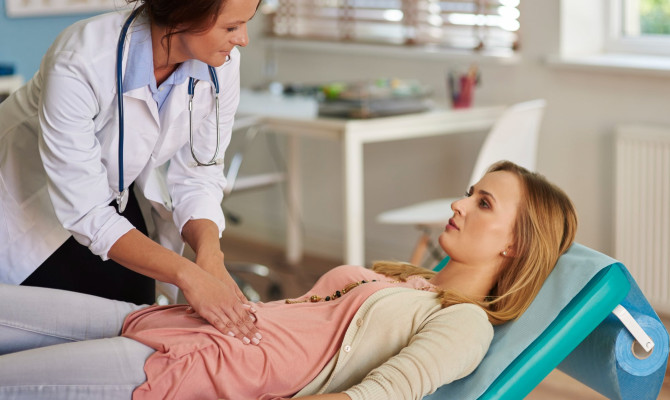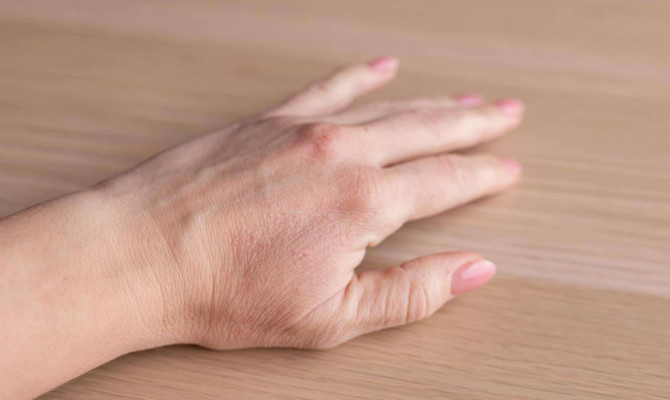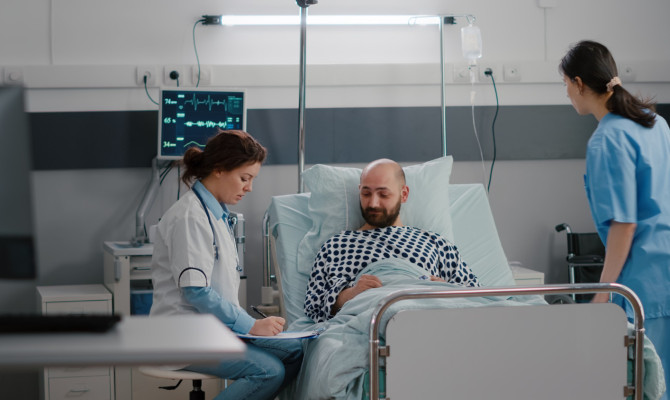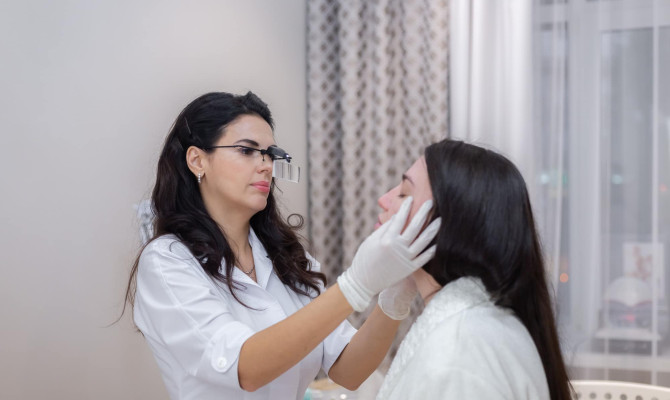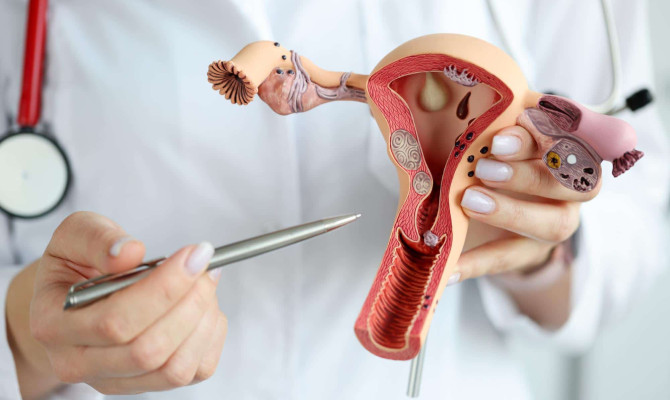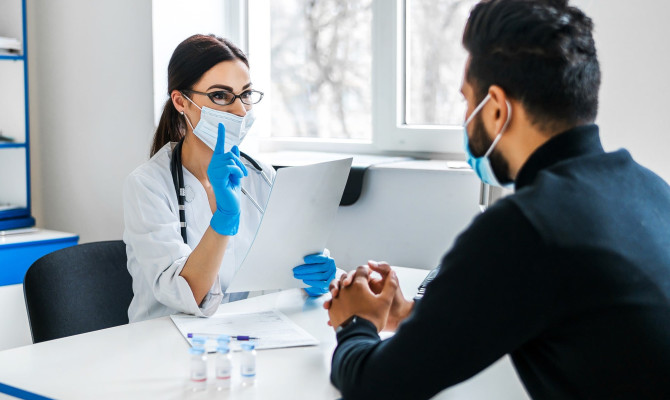Polyps: What do I need to Know?

- Polyps
- 22 Aug 2023
Overview
What are Polyps?
The human body can generate polyps, which are growths, in various organs and tissues. While some polyps are benign and non-cancerous, others have the potential to develop into malignant growths and disseminate to other areas of the body. Early detection and effective care of distinct types of polyps depend on understanding their symptoms, underlying causes, and biology.
The most typical polyp kinds, their corresponding symptoms, and each type’s possible causes are all covered in this article.
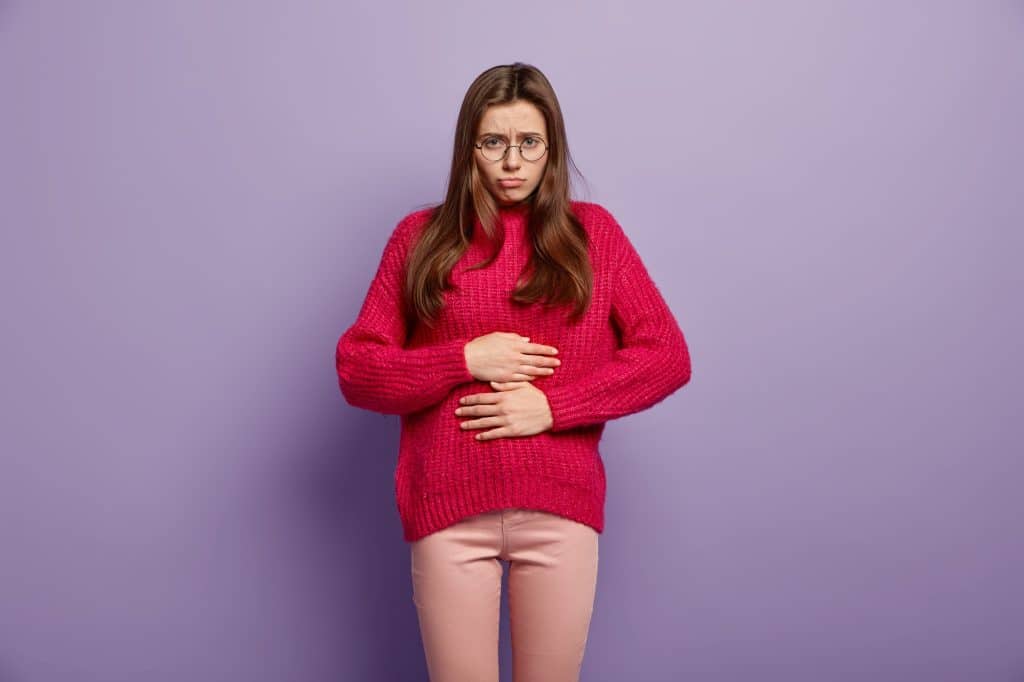
Types
Types of Polyps
Based on the location of the polyps, they can be:
- Colorectal
- Nasal type
- Throat polyps
- Ear canal type
- Stomach polyps
- Gall bladder types
- Uterine polyps
- Cervical polyps
- Urinary bladder type
Colorectal
- What is it – Colorectal polyps are growths that appear in the large intestine or rectum and are typically found during routine colonoscopies.1Types| Researched based study from Medlineplus.gov
- Causes – colorectal polyps are believed to arise due to abnormal cell growth and certain risk factors, such as age, lifestyle choices, chronic inflammation of the colon, etc.
- Symptoms – may include blood in the stools, fatigue, diarrhea, constipation, or abdominal pain.2Types| Researched based study from Nlm.nih.gov
Nasal type
- What is it – Nasal polyps are soft, non-cancerous growths that forms in the sinuses or nasal passages.3Types| Researched based study from Mayoclinic.org
- Causes – Chronic inflammation of the nasal mucosa due to allergies, asthma, infections, or blockages may cause nasal polyp formation.
- Symptoms – may include a change in smell, headache, pressure around the sinuses, facial or upper teeth pain, or difficulty breathing4Types| Researched based study from Hopkinsmedicine.org
Throat polyps
- What is it – Are growths on the vocal cord.
- Causes – may include long-term overuse of the voice, allergies, hypothyroidism, smoking, side effects of certain medications, or gastroesophageal reflux disorder (GERD).5Types| Researched based study from Nm.org
- Symptoms – may include voice change, neck pain, feeling like something is stuck in the throat, delayed sound while people begin to talk, or frequent clearing of the throat.
Ear canal type
- What is it – Are polyps that grow in the external or middle ear canal.6Types| Researched based study from Mountsinai.org
- Causes – include cholesteatoma, inflammation, tumor, or foreign object
- Symptoms – include hearing loss and bloody discharge from the ear.
Stomach polyps
- What is it – are growths that develop on the stomach’s lining.
- Causes – long-term inflammation in the stomach or long-term medications like proton pump inhibitors.7Types| Researched based study from Mayoclinic.org
- Symptoms – may include nausea, pain on pressing the stomach, blood in stool, and anemia.
Gall bladder types
- What is it – Polyps that grow in a person’s gall bladder.
- Causes – may include cholecystitis or cholesterol accumulation in the gall bladder.
- Symptoms – may not show any signs and may rarely cause pain.8Types| Researched based study from Clevelandclinic.org
Uterine polyps
- What is it – Uterine polyps are growths that emerge in the inner lining of the uterus and can vary in size and shape.
- Causes – Hormonal variables appear to be at work, like estrogen sensitivity which means that the uterine polyps expand in response to estrogen in the body.
- Symptoms – may include bleeding between periods, infertility, very heavy period, and vaginal bleeding.9Types| Researched based study from Mayoclinic.org
Cervical Polyps
- What is it – Grow in the lining of the cervix.
- Causes – The specific cause of cervical polyps is not well-established, but chronic inflammation and hormonal changes are considered potential factors.10Types| Researched based study from Mountsinai.org
- Symptoms – may include irregular vaginal bleeding, particularly after sexual intercourse, and post-menopausal bleeding.
Urinary bladder type
- What is it – Bladder polyps are abnormal growths that can occur on the inner lining of the urinary bladder.
- Causes – Chronic irritation or inflammation of the bladder lining
- Symptoms – may include pain during urination, frequent urination, and blood in the urine. 11Types| Researched based study from Betterhealth.vic.gov.au
Diagnosis
Diagnosis of Polyps
Diagnosing a polyp may involve a physical examination, questions related to the symptoms, if any, and a few diagnostic tests:
- Imaging tests – may include an ultrasound, X-ray, or CT scan.
The doctor may suggest any of the following methods based on the location of the polyps to remove the tissue for further evaluation:
- Endoscopy
- Colonoscopy 12Diagnosis| Researched based study from Niddk.nih.gov
- Gastroscopy
- Hysteroscopy 13Diagnosis| Researched based study from Hopkinsmedicine.org
Treatment
Polyps Treatment
Depending on the nature and location of the polyps, they are approached differently. Some polyps won’t need to be treated because they are most likely harmless, while a doctor often removes others.
Several variables influence how polyps are treated, including:
- Size
- Type
- Number
- Location
- Cancerous or not
And may include the following management techniques:
- Rest
- Medications
- Surgery
Advice rest
- Small polyps in the throat may only require voice rest and speech therapy because they may disappear after a period of rest for the throat, while larger polyps may need to be removed.
Medications
- Corticosteroid medicines or nasal steroid sprays treat nasal polyps and reduce inflammation.4Treatment| Researched based study from Hopkinsmedicine.org
- Hormone-related polyps, including cervical and uterine polyps, can be treated with progestin and gonadotropin-releasing hormone agonists.10Treatment| Researched based study from Mountsinai.org
- Chronic inflammatory bowel disease (IBD) may potentially be treated with medications.
Surgical methods
- To prevent cancer growth in the future, a surgeon may need to surgically remove some polyps, including colorectal, bladder, and stomach polyps.
- The polyps will be surgically removed as soon as possible if they are expanding in size, numerous polyps are present at one site, an ulcer is developing, or a malignant transformation is occurring.14Treatment| Researched based study from Cedars-sinai.org
Prevention
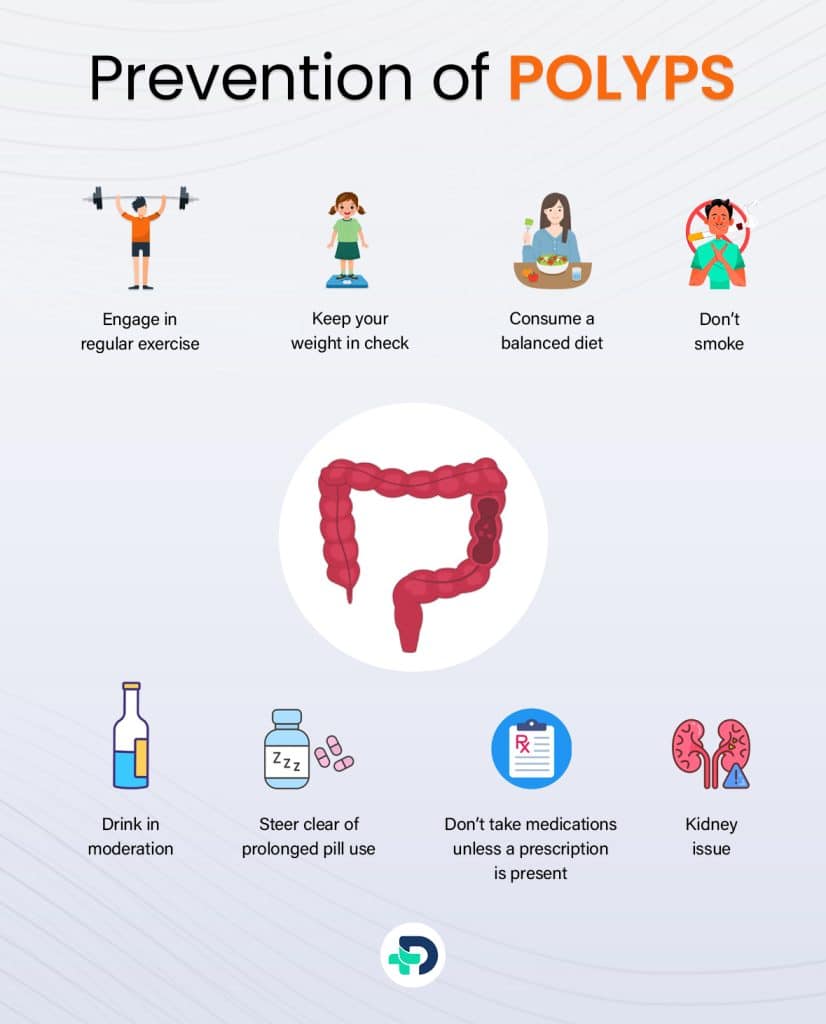
Prevention of Polyps
Polyps are not always preventable. However, the following measures can help reduce the likelihood that some polyps will develop into cancer :
- Engage in regular exercise
- Keep your weight in check
- Consume a balanced diet
- Don’t smoke
- Drink in moderation 15Prevention| Researched based study from Healthdirect.gov.au
- Steer clear of prolonged pill use
- Don’t take medications unless a prescription is present
- Have regular examinations and screenings performed
Complications
Complications
Polyps may cause various health complications, including:
- Bleeding
- Nasal obstruction
- Breathing difficulties
- Fertility problems
- Iron deficiency anemia
- Vaginal bleeding
- Abnormal overgrowth
- Bowel obstruction
- Ulceration
- Cancer 2Complications| Researched based study from Nlm.nih.gov
Bottom line
The Bottom Line
Early detection and effective therapy of distinct forms of polyps depend on understanding their symptoms, underlying causes, and diverse types of polyps. Regular screenings, including gynecological exams and colonoscopies, can aid in the early detection of polyps, assuring prompt treatment and minimizing any problems. For a thorough assessment and individualized management, speak with a healthcare provider if you suffer polyps-related symptoms.
Any feedback on this article?
 This Articles content was accurate
This Articles content was accurate Very Informative Article
Very Informative Article I have a question or a comment
I have a question or a comment
 This article contains inaccurate content
This article contains inaccurate content This article was not helpful
This article was not helpful I have a question or a comment
I have a question or a comment
We appreciate your helpful feedback!
Checkout our social pages
References
-
Medline Plus
Colorectal polyps | Types
-
National Library of Medicine
Colon Polyps | Types | Complications
-
Mayo Clinic
Nasal polyps | Types
-
John Hopkins Medicine
Nasal Polyps | Types
-
Northwestern Medicin
Causes and Diagnoses of Vocal Cord Polyps and Nodules | Types
-
Mount Sinai
Aural polyps | Types
-
Mayo Clinic
Stomach Polyps | Types
-
Cleveland Clinic
Gallbladder Polyps | Types
-
Mayo Clinic
Uterine polyps | Types
-
Mount Sinai
Cervical polyps | Types
-
Better Health Channel
Bladder | Types
-
National Institute of Diabetes and Digestive and Kidney Diseases
How do doctors diagnose colon polyps? | Diagnosis
-
John Hopkins Medicine
Hysteroscopy | Diagnosis
-
Cedars Sinai
Gastric Polyps | Treatment
-
Health Direct
Polyps | Prevention













